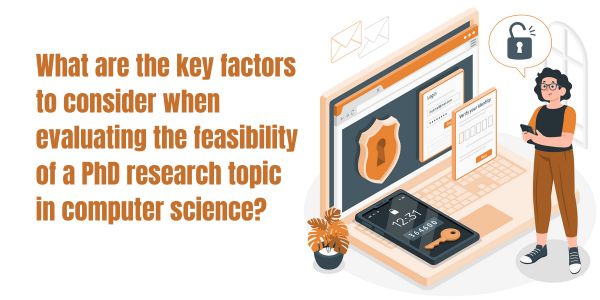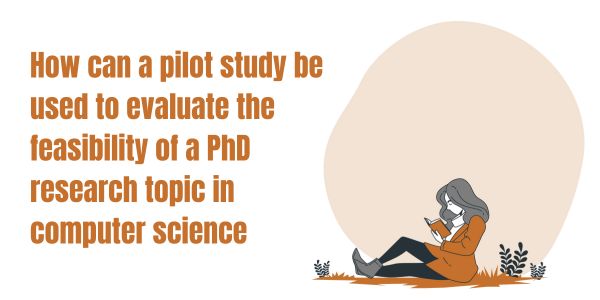Starting a PhD journey is exciting but picking the right research topic can be tough. In this guide, we’ll explore the top three best PhD research topics for 2024-25. We’ll also share tips on how to choose a PhD topic that fits your interests and academic goals. Figuring out how to choose a research topic for a PhD may seem tricky, but we’re here to help simplify it for you.
Selecting the right research topics in commerce for PhD is crucial as it defines the trajectory of your academic journey. A well-chosen topic aligns with personal interests, contributes to existing knowledge, and enhances career prospects. Thorough consideration ensures a meaningful and impactful research endeavor in the dynamic field of commerce and also in research topics in computer science for phd in software engineering.
Whether you’re into advanced technology, groundbreaking science, or social issues, this “how to choose a phd topic” guide will give you the know-how to make a smart decision. Join us as we unravel the mystery of picking strong and meaningful research topics for phd in commerce and in other fields. Let’s make your academic journey a bit smoother together.
How to Choose a PhD Topic?
The ways to how to choose a research topic for PhD is described below:
a) Identify Personal Interests:
~ Explore topics aligning with your passion within the broader scope of research topics in commerce for PhD.
b) Assess Available Resources:
~ Ensure access to relevant literature, data, and support for your chosen research area.
c) Consider Academic Significance:
~ Choose a topic that contributes to existing knowledge, addresses gaps, and showcases your intellectual engagement.
d) Consult with Mentors:
~ Seek guidance from academic mentors to refine your ideas and receive valuable insights.
Research Topics in Commerce for PhD
Let us know how to write innovative research topics in commerce for PhD:
i) Explore Personal Interests: Identify areas within commerce that genuinely interest you.
ii) Review Current Literature: Analyze existing research to discover gaps or emerging trends.
iii) Consult with Advisors: Seek guidance from academic advisors for potential research directions.
iv) Consider Industry Relevance: Look into topics with practical applications and relevance to the business world.
v) Evaluate Resource Availability: Ensure access to necessary data, literature, and support for your chosen topic.
vi) Stay Informed: Keep abreast of current events and advancements in commerce for inspiration and relevant research ideas.
vii) Networking: Engage with peers, professionals, and experts in the field for valuable insights and potential research collaborations.
Research Topics for PhD in Commerce
Now, let’s dive into the best research topics for phd in commerce for 2024-25:
i) Financial Technology (FinTech) Innovations:
~ Explore the impact of emerging technologies like blockchain and AI on financial systems and services.
ii) Sustainable Business Practices:
~ Investigate strategies for integrating sustainability into commerce, considering environmental, social, and economic aspects.
#PhD Research Topics in Computer Science
The phd research topics in computer science is described below:
i) Machine Learning for Software Testing Automation: Explore advanced machine learning techniques to enhance automation in software testing processes.
ii) Security and Privacy in Cloud Computing: Investigate novel methods to bolster security and privacy measures in cloud computing environments.
iii) Natural Language Processing for Code Generation: Explore the application of natural language processing in generating code snippets and improving software development efficiency.
#Research Topics in Computer Science for PhD in Software Engineering
The trending research topics in computer science for phd in software engineering is described below:
How to Choose a Research Topic for PhD in Computer Science:
i) Identify Personal Interest: Align the topic with your passion and career goals.
ii) Assess Academic Significance: Opt for a topic that contributes to existing knowledge and addresses gaps in the field.
#PhD Research Topics in Computer Science:
i) Quantum Computing Algorithms: One of the phd research topics in computer science is exploring novel algorithms for quantum computers.
ii) Cybersecurity in IoT: Focus on securing Internet of Things devices and networks.
# Research Topics in Computer Science for PhD in Software Engineering:
i) DevOps in Software Development: Examine the integration of DevOps practices for efficient and collaborative software development.
ii) Software Testing Automation: Explore advancements in automated testing techniques to ensure software quality.
Now, let us dive into the Top 3 Best PhD Research Topics for 2024-25 which can help you to jumpstart your research.
# Quantum Computing and Its Applications
i)Pioneering Technological Frontier: Quantum computing stands at the forefront of technological innovation, offering unparalleled potential to revolutionize computation, making it an exciting and cutting-edge field.
ii) Interdisciplinary Impact: Its applications span various domains, including finance, logistics, and healthcare, providing an interdisciplinary playground for researchers, appealing to a broad range of interests.
iii) Future-Proofing Research: Choosing a research topics for phd in commerce and also in other fields involves foreseeing its relevance in the future. Quantum computing’s rapid advancements ensure a continuously evolving landscape, making it a future-proof research choice.
iii) Role of Literature Review: Understanding the role of literature review in research is pivotal when delving into quantum computing. A thorough review will uncover gaps, guide methodologies, and position the research within the broader context of existing knowledge.
# Climate Change Mitigation Strategies
i) Climate change mitigation is a critical concern globally, making it an impactful and socially relevant research topic for PhD candidates.
ii) This topic transcends disciplines, attracting researchers from diverse fields, including commerce, computer science, and software engineering, fostering collaboration and a holistic approach to solutions.
iii) Within research topics for PhD in commerce, climate change mitigation strategies offer opportunities to investigate the economic impact of green technologies, sustainable practices, and policy interventions on businesses and industries.
# Data Science for Healthcare and Precision Medicine
i) High Impact on Society:
Data Science for Healthcare and Precision Medicine is a top PhD research topic due to its potential to revolutionize healthcare, making it socially relevant and impactful on a global scale.
ii) Interdisciplinary Nature:
This topic seamlessly integrates with various disciplines, attracting researchers not only from healthcare but also from commerce, computer science, and software engineering, fostering collaborative and comprehensive solutions.
iii) Advancements in Commerce and Healthcare:
Within research topics for PhD, the application of data science in healthcare has significant implications.
Final Thoughts
In closing our guide to the best PhD research topics for 2024-25, we’ve explored exciting possibilities for new researchers on how to choose a phd topic. Figuring out how to choose a research topic for PhD is a big deal, and we’ve looked at options that suit different interests and academic goals.
Whether you’re into commerce, computer science, or research topics in computer science for phd in software engineering, these top research topics provide a great starting point. Choosing a research topics in commerce for PhD involves connecting your interests with important academic stuff, making sure you have what you need, and being ready for things to change.
As you start this journey, whether it’s in commerce, computer science, or software engineering, enjoy the chances to work with different areas and come up with new ideas if you want to know how to choose a research topic for PhD. May your PhD adventure be full of learning and making a difference as you dive into research in 2024-25!
PhDthesis.in plays a pivotal role in assisting PhD researchers during the crucial phase of topic consultation and topic selection for their research. Here’s how it supports scholars who want to know how to choose a phd topic:
i) Expert Guidance: The platform recognizes the critical significance of a well-defined research topic. It ensures that researchers choose a topic that is neither too broad nor too narrow. By offering expert consultation, it helps scholars identify captivating and unique topics that align with their academic interests.
ii) Literature Review and Gap Analysis: PhDthesis.in reviews existing literature, identifying gaps and areas for exploration. This process ensures that the selected topic contributes meaningfully to the research landscape. Scholars receive personalized suggestions based on their skill set and career aspirations.
iii) Proposal Foundation: A strong proposal begins with a competent topic. PhDthesis.in assists researchers in formulating research problems that lead to manageable and impactful studies. By providing well-researched and interesting topic ideas, it sets the foundation for remarkable research work.
FAQs
a) How would I determine whether the topic of my PhD is interesting?
Ans. Interest is subjective; if your PhD topic engages you and aligns with your goals, it’s likely interesting.
b) How did you eventually decide the topic of your PhD thesis?
Ans. After careful consideration of my interests, academic gaps, and future impact.
c) Can you change your PhD topic?
Ans. Yes, you can change your PhD topic with proper approval from your academic advisor.
d) Can two students get their PhD on one thesis topic?
Ans. Typically, two students can pursue PhDs on the same thesis topic with distinct contributions.
e) Should I seek a PhD in a field I have no interest in?
Ans. It’s advisable to pursue a PhD in a topic that genuinely interests you for a more fulfilling journey.
f) Is it possible to choose your own PhD topic in engineering?
Ans. Yes, you can often choose your own PhD topic in engineering with approval from your advisor.
g) What are the hottest PhD research topics?
Ans. Hottest PhD research topics vary, but data science, artificial intelligence, and sustainable energy are currently popular.






